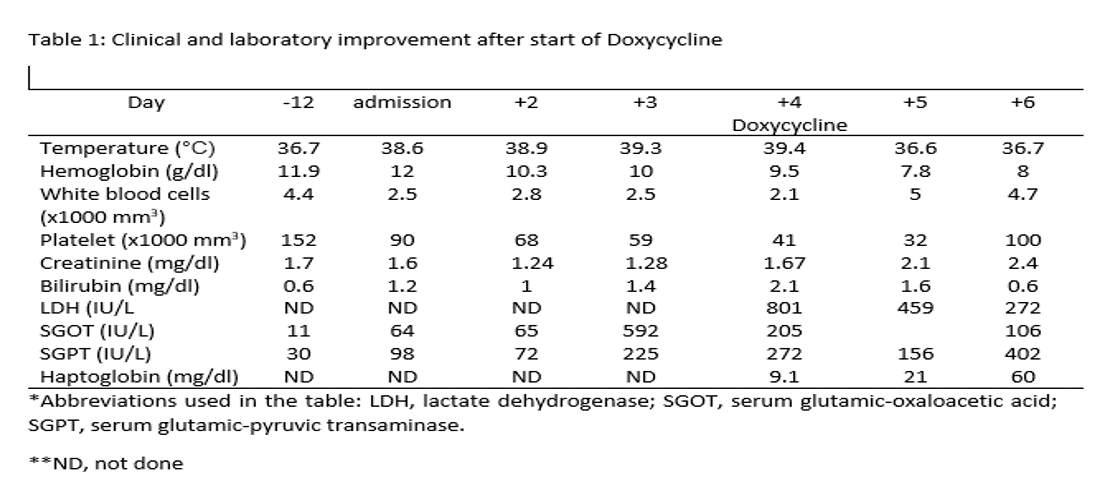Ehrlichiosis Infection Presenting as Thrombotic Microangiopathy Early after Kidney Transplantation
W. Hassan1, M. Talwar2, V. Balaraman2, B. Wall1, M. Molnar1
1Medicine-Nephrology, University of Tennessee Health Science Center, Memphis, TN, 2Department of Surgery, Transplant Surgery, Methodist University Hospital, James D Eason Transplant Institute, Memphis, TN
Meeting: 2020 American Transplant Congress
Abstract number: C-197
Keywords: Elderly patients, Infection, Kidney transplantation, Thrombocytopenia
Session Information
Session Name: Poster Session C: Kidney Infectious Excluding Polyoma & Viral Hepatitis
Session Type: Poster Session
Date: Saturday, May 30, 2020
Session Time: 3:15pm-4:00pm
 Presentation Time: 3:30pm-4:00pm
Presentation Time: 3:30pm-4:00pm
Location: Virtual
*Purpose: Fever of unknown origin and clinical picture of Thrombotic MicroAngiopathy (TMA) are diagnostic challenges in the early period after kidney transplantation. Here we present a case where human Ehrlichiosis was found behind this clinical presentation within few weeks after transplantation
*Methods: Case presentation
*Results: A 52-year-old male received a deceased donor kidney transplantation with immediate graft function and uneventful post-transplant course, was discharged on triple immunosuppressive therapy. The patient admitted 2 weeks later with fever for 3 days, rigors, nausea, fatigue, headache and loose nonbloody stool. He lives in Arkansas where he had 9 cats and 4 dogs in his garden, nevertheless he denied recent gardening or sick contact. His laboratory studies revealed transaminitis, leukopenia, hyponatremia and features of TMA in the form of thrombocytopenia, low haptoglobin, elevated LDH and decline of graft function. However, peripheral blood smear did not show schistocyte or platelet clumps. Coombs test was negative. Also CH50 and ADAMTS13 activity was within normal value. In addtition, there was no significant laboratory derangement in plasma fibrinogen level, prothrombin time or partial thromboplastin time. Extensive fever workup was done including chest x-ray, ultrasound abdomen, blood cultures, urine culture, echocardiogram, CT scan of the abdomen, pelvis and chest, MRI of the brain, lumbar puncture, clostridium difficile and CMV PCR, all were relatively unremarkable. Therapeutic plasma exchange was started while patient was on broad spectrum antibiotics. He developed worsening graft function, hence kidney allograft biopsy was done which showed focal myoglobin tubular cast with no evidence of rejection or TMA. At this point oral Doxycycline was empirically initiated with dramatic remission of fever and symptoms as well as rapid improvement of platelet count, lactate dehydrogenase level and hemolytic anemia. Moreover, the allograft function totally normalized in 4 weeks. Previously sent Ehrlichia chaffeensis DNA test confirmed human ehrlichiosis in the blood, though the donor was not infected.
*Conclusions: Human Ehrlichiosis should be considered as a differential diagnosis in kidney transplant recipients with clinical picture of TMA and fever of unknow origin.
To cite this abstract in AMA style:
Hassan W, Talwar M, Balaraman V, Wall B, Molnar M. Ehrlichiosis Infection Presenting as Thrombotic Microangiopathy Early after Kidney Transplantation [abstract]. Am J Transplant. 2020; 20 (suppl 3). https://atcmeetingabstracts.com/abstract/ehrlichiosis-infection-presenting-as-thrombotic-microangiopathy-early-after-kidney-transplantation/. Accessed February 21, 2026.« Back to 2020 American Transplant Congress

